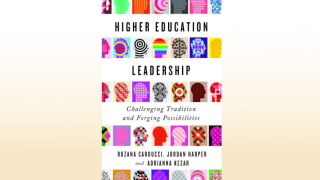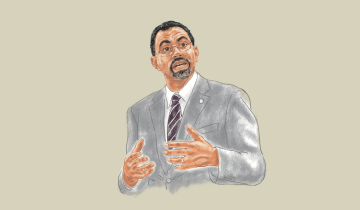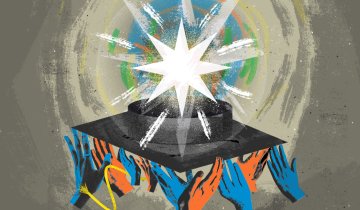Adrianna Kezar, a national expert of change and leadership in higher education, Dean’s Professor of Leadership and director of the Pullias Center for Higher Education, discusses her new book Higher Education Leadership: Challenging Tradition and Forging Possibilities (John Hopkins University Press) hitting bookshelves on Feb. 6. The book, co-authored with Rozana Carducci and Jordan Harper PhD ’23, offers new visions of higher education leadership guided by shared equity leadership, equity minded leadership and liberatory design thinking. Below, Kezar and Harper discuss the catalyst behind writing the book and offer key takeaways.
What motivated you to write Higher Education Leadership?
Adrianna Kezar: I wrote a higher education textbook back in 2006 with one of my graduate students Melissa Contreras-McGavin and Rozana Carducci—a then graduate student at UCLA (now a faculty at Elon University) who I had become acquainted with. We all had an interest in changing the dialogue about higher education leadership, which was very hierarchical and followed great man's theories of leadership that suggests that leaders are born and not made. We wanted to update the thinking with the literature we saw coming from other fields such as sociology, women’s studies and political science that offered a more progressive view of leadership.
By 2020, this book was in need of updating, especially with all the changes happening in the world—Black Lives Matter and calls for racial justice, neoliberalism having taken over higher education, and the pandemic to name a few. It was time to bring in new voices from indigenous and critical studies to add to our last critique. We hope this can serve as a textbook for higher education courses the next 15-20 years again. Rozana joined again as a co-author and Jordan Harper PhD ’23 in Urban Education Policy working with me (now faculty at Morgan State University), joined the team. Sadly, Melissa passed away a few years back. We dedicate the book to her and other fierce advocates for social justice.
Jordan Harper: I was eager to join Adrianna and Rozana in updating the 2006 book. Echoing Adrianna’s point, it was time for a new book in the field that took seriously issues related to neoliberalism and White supremacy and how they are actively shaping leadership research, practice and priorities. We wanted to create a book that we, along with our colleagues across the country, could teach and would invoke critical dialogue in higher education classrooms. As much as we have framed this as a textbook, we also thought about higher education leaders picking up the book and referencing it in their work.
"We highlight two key challenges—White supremacy and neoliberalism—as two reinforcing trends that maintain the status quo in higher education and prevent progressive changes..."
—Adrianna Kezar, director of the Pullias Center for Higher Education
What are the main challenges in higher education leadership and how does the book address those challenges?
AK: We highlight two key challenges—White supremacy and neoliberalism—as two reinforcing trends that maintain the status quo in higher education and prevent progressive changes such as new curriculum, alternate approaches to teaching and learning, approaches to support students or diversifying the faculty among the many needed changes that have been blocked for decades. We describe how these forces (White supremacy and neoliberalism) operate, how they are embedded into leadership and their impact. We offer new visions of higher education leadership guided by concepts such as shared equity leadership, equity minded leadership and liberatory design thinking.
JH: As a consequence of the rise of White supremacy and neoliberalism, notions of equity and the public good get lost in the shuffle. This is a leadership problem. As White supremacy and neoliberalism become even more dominant and observable in colleges and universities, institutional leaders are still espousing commitments to equity and the public good, but are not doing the work or distributing organizational resources in ways that actualize those commitments. Throughout the entire book, we offer new ways for leaders to walk the walk and not just talk the talk.
"I can confidently say that this text is perhaps the most critical and comprehensive leadership book that the field of higher education has seen."
—Jordan Harper PhD ’23, co-author of Higher Education Leadership
The book discusses new interdisciplinary leadership approaches for resisting and dismantling oppressive systems. How different is this from previous approaches?
AK: We build off of some earlier promising leadership approaches such as transformational leadership, chaos, cognitive, cultural and processual theories of leadership highlighted in the 2006 book. But we update those theories with new thinking emerging from various disciplines and lift the newer thinking occurring in higher education as well. We also ensure that antiracist approaches and critical theories are engaged across various disciplines.
JH: The book is really powered by grassroots and feminist approaches to systemic social change. One critique of the leadership literature, even still today, is that it remains hierarchical and does not challenge oppressive systems in critical and urgent ways. We leaned on the works of feminists like Ruth Wilson Gilmore and Audre Lorde and perspectives from the social movements literature to emphasize the importance of collective action, critique and strategically chipping away at systems to erect new ones in their place. I can confidently say that this text is perhaps the most critical and comprehensive leadership book that the field of higher education has seen. It was greatly enhanced by building bridges between fields and disciplines.
What are some key takeaways or insights from the book that can benefit leaders in the field of higher ed?
AK: First, we articulate how leadership research and practice can be a pathway to social justice, not oppression. Social justice leadership names and dismantles systems and structures of oppression, is explicitly anti-racist, identity centered, advocacy oriented and equity minded. While we dive deeply into the twin pillars of leadership that reinforce the status quo—neoliberalism and White supremacy—we also help provide an alternative to today’s existing leadership. When we wrote the book in 2006, it looked as if leaders were moving toward more social justice approaches, but the last 20 years have arced away from social justice and decidedly toward the status quo.
Another takeaway is that many leadership theories we explored in the 2006 book remain helpful approaches for advancing leadership, but we offer updates of these theories to ensure they serve the goals of social justice. We note how neoliberalism and White supremacy have been co-opted by many approaches, such as team leadership, that seemed to offer more socially-just approaches. It is important to really explore the underlying assumptions of an approach to ensure it is moving toward those goals. We want to reiterate there is a lot of good thinking about leadership that can guide practice. We really lift up the best ideas and concepts for today’s context and we reinforce the need for on-going reflection and questioning of our current systems because these non-progressive ideas are deeply embedded in campus policies, practices, structures and cultures.
To guide practice, we offer tangible and concrete approaches to be equity minded, demonstrate how to center liberation, social justice and humanization, and how to reevaluate White leadership approaches. We are also excited to offer many new research areas, for example, around ethical leadership, the role of context in transformational leadership, ways to encourage personal growth around equity in collaboration, pathways to disrupt white assumptions in cognitive theories of leadership, more research from an intersectional perspective and authentic leadership.
Is there anything else you’d like to add?
AK: The book chapters each have rich case studies to help leaders see concepts in practice and to apply ideas. We also have discussion questions to guide class discussions. We planned this to be a textbook as well as a resource for working higher education leaders. And it is aimed to provoke and make leaders think hard about the choices they make, seeing the ethical implications of leading.
JH: I am excited for readers to build upon the work we have done in the book. There are so many threads throughout the book for scholars, practitioners and leaders to continue unraveling or building upon. I think we have started an important discussion about what leadership for liberation can and should look like in higher education.





